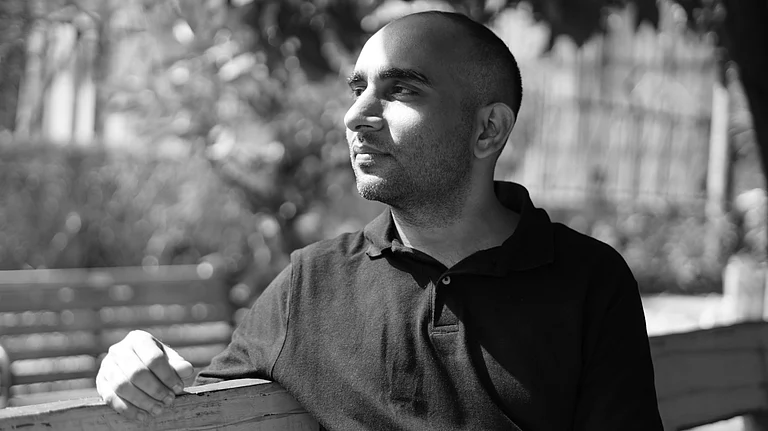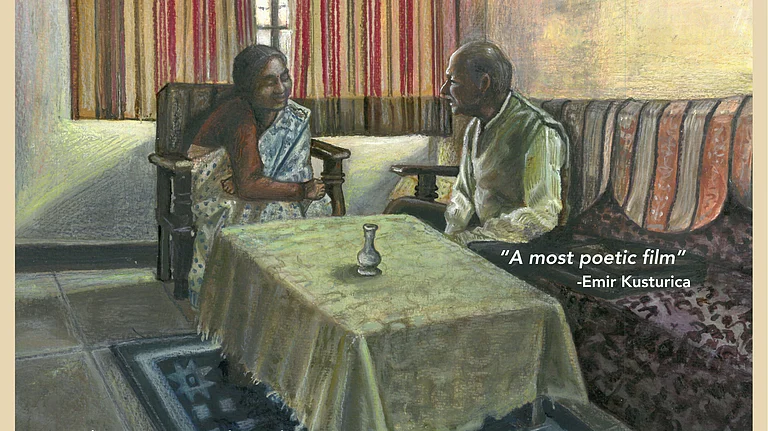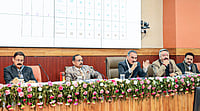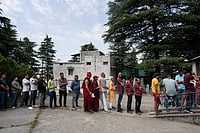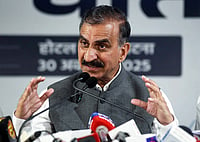A young, school-going boy harbours hope of a major transformation of his village after a local MLA promises that a road will be constructed, and internet connectivity will end the village’s isolation from the rest of the world. But soon, all his dreams get shattered, and he finds himself confronting caste discrimination.
Among the 105 films screened at the 10th International Film Festival of Shimla (IFFS)—a three-day event (August 16-18) at Shimla’s historic Gaiety Theatre—Preety Sharma’s short film Dhroov Ki Ghaas received a “Festival Mention” in the category of films being made in Himachal.
The film reflects on hard realities of the mountains—a deep- rooted caste system still prevalent despite the state having the highest literacy rate, second after Kerala. Ancient customs and beliefs often dominate logic.
Sharma’s transition from a Bollywood scriptwriter to an independent filmmaker is both poignant and powerful. Her return to Mandi, where she reconnects with her roots, symbolises more than just a change of landscape; rather, it marks a deeper reconnection with her heritage and a passionate commitment to shed light on the vibrant yet challenging lives of the mountain communities.
After honing her craft for 15 years in Bombay’s bustling arena, she has embarked on a transformative journey into independent filmmaking. Her storytelling prowess combines resilience with remarkable adaptability, crafting narratives that resonate deeply with local conditions, making her work, both relevant and impactful.
“Having deep roots in my homeland and subsequently working in Bombay, I always felt a strong desire to highlight societal issues on a global stage. I intentionally used Madyali, the local dialect of Mandi, to align the theme with local conditions,” she says.
Two boys who featured in the film—Tarun Thakur and Rakesh Arnote—are the products of a local drama school being run by Seema Sharma. One of the main characters–Deep Kumar—is a versatile theatre artist, who also runs his own Facebook page to promote Mandyali.
Kumar claims that of late, due to the efforts put in by theatre and folk artists, writers and media professionals, and especially social media users, local languages have started getting a lot of attention. There are others as well who are doing their bit to promote local dialects—a media professional has started a podcast in Mandyali while a few youths have started YouTube channels. Two years ago, Dev Kanya Thakur, a filmmaker and writer from Kullu made a film—Mohra—in Kullvi, the local dialect of Kullu. This was Sharma’s second film. The first one, White Rose, was shot in Shimla.
The festival attracted filmmakers from 27 countries and 22 states from India, with submissions from nations like Iran, Nepal, Bangladesh and Sri Lanka.
Among the other films screened at the festival included a highly acclaimed Iranian short film, The Borders Never Die, directed by Hamidreza Arjomandi. Earlier, the film won the Special Jury Award and Special Diploma for Best Short Film at the 4th Diogenes Film Festival 2023, in Tbilisi, Georgia.
The story of the film is based on a Kurdish couple—a pregnant woman and her husband—fleeing from Iraqi Kurdistan due to war in their homeland.
Migration was the central theme of an Iranian short film, Survivor. The 13-minute short film is by Karim Azimi, a film director with 30 years of experience
The film Kaina by Aaryaveer Singh tells the story of Kanak, a transgender who faces challenges in finding his identity both within the family and society. Ultimately, Kanak finds solace and acceptance within the Eunuch community, where he self-discovers as Kanina, a name that symbolises God’s creation, reflecting a profound transformation and acceptance.
The film festival is a prominent event celebrating the art of filmmaking and the impact of storytelling. This year's festival featured 105 films, including documentaries and short fiction, all focusing on significant social themes.
The festival also touched upon the theme of feminism through the story of a female schoolteacher in an Iranian film—Mixed—directed by Mina Sadat Hosseini. It grapples with the dilemma of choosing between silence and protest in response to sexual harassment.
“The festival, which featured films from 27 countries and 22 states, provided a platform to young and veteran filmmakers to showcase their compelling stories in various genres, languages and perspectives under one roof.
The Best Feature Film in the International category was awarded to On My Way directed by Thierry Obadia.
Garun Dhiman’s short documentary—Beyond Purpose—captures the breathtaking landscapes of the Indian Himalayas, highlighting the natural beauty of the mountains and the effects of climate change. Through poignant visuals and creative storytelling, the film explores the deep connection between nature and humanity.
Dhiman notes: “The film relates an intense bond between the environment and people. It features personal anecdotes and striking scenes of rock climbing and other actions in the harsh, snowy conditions.” The film also serves as a powerful reminder about people’s duty to protect the planet and seek a meaningful purpose in life.
The documentary’s protagonist, Rajat Thakur, a local resident, drives the viewers through the challenges faced by the mountain communities. It highlights the impact of rising temperatures and its adverse impact on natural resources like water and glaciers, and the entire ecosystem. The film calls for a collective effort to combat climate change. It was honoured with a special mention at the film festival.
One of the highlights of this year’s festival was the presence of actress Seema Biswas—known for her powerful role in the film Bandit Queen—a 1994 Hindi-language biographical action film based on the life of Phoolan Devi.
At one of the sessions, she shared her experiences of featuring in a film made on Phoolan Devi whom she met only after the film was released. It was awarded as the Best Feature Film in Hindi at the National Film Festival and later premiered at the Directors’ Fortnight section of the 1994 Cannes Film Festival.
Himachal Pradesh governor Shiv Pratap Shukla presented the awards to the winners who also included foreign film directors and filmmakers, besides those from Himachal.
Among the vast array of films from Iran, the US, the UK, Bangladesh, Malaysia, Sweden, China, New Zealand, Nepal, Sri Lanka, France, Portugal; films from Maharashtra, Assam, Kerala and Tripura were also screened simultaneously at the festival.
Acclaimed Malayalam thriller Manjummel Boys, based on the true story of a daring rescue mission that took place at Guna Caves in 2006 was screened as well. The film brings to life the story of a group of friends from the small town of Manjummel, near Kochi, who go on a vacation to Kodaikanal. Their trip takes a dramatic turn when one of them becomes trapped in the Guna Caves, also called The Devil's Kitchen in Tamil Nadu, setting off a high-stakes rescue operation. The film is written and directed by Chidambaram S Poduval, a leading name in Malayalam cinema.






.jpg?w=801&auto=format%2Ccompress&fit=max&format=webp&dpr=1.0)
